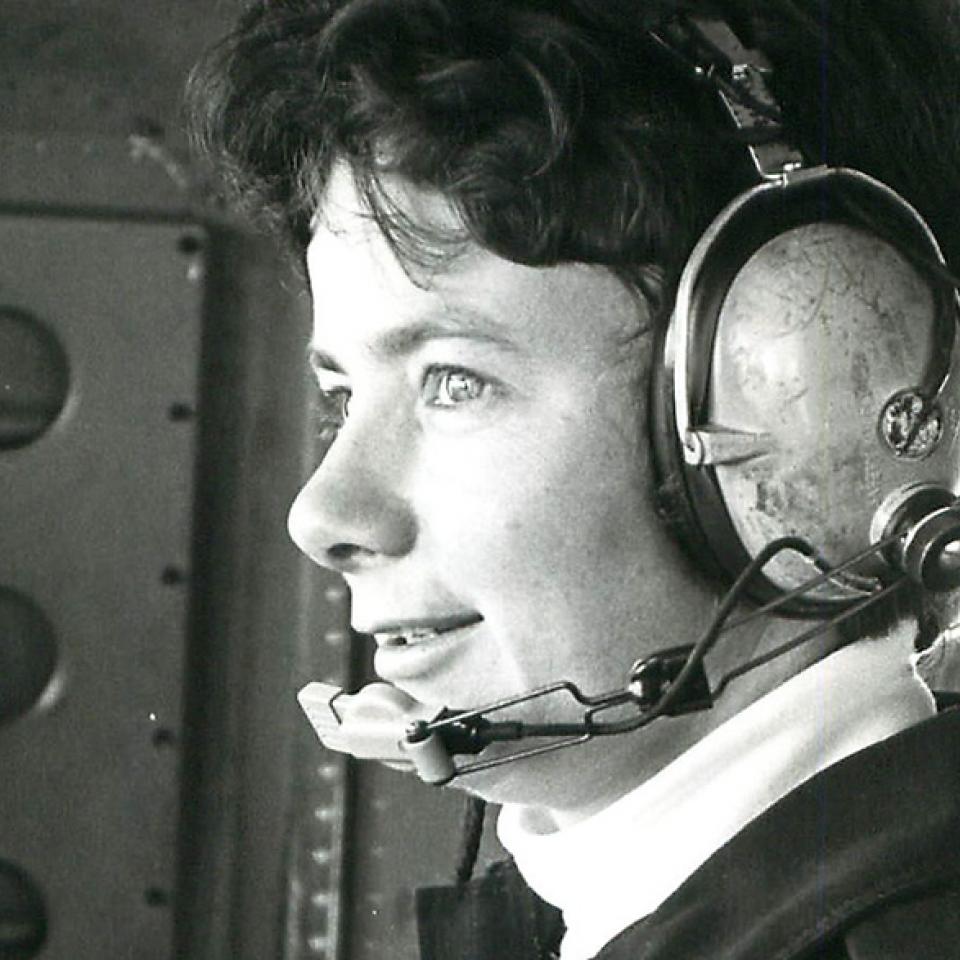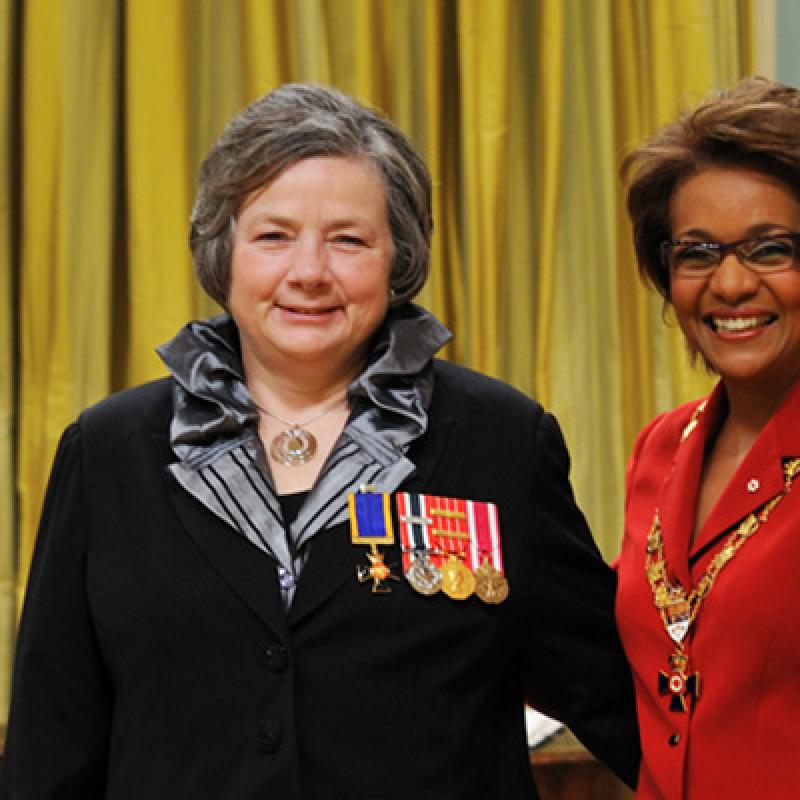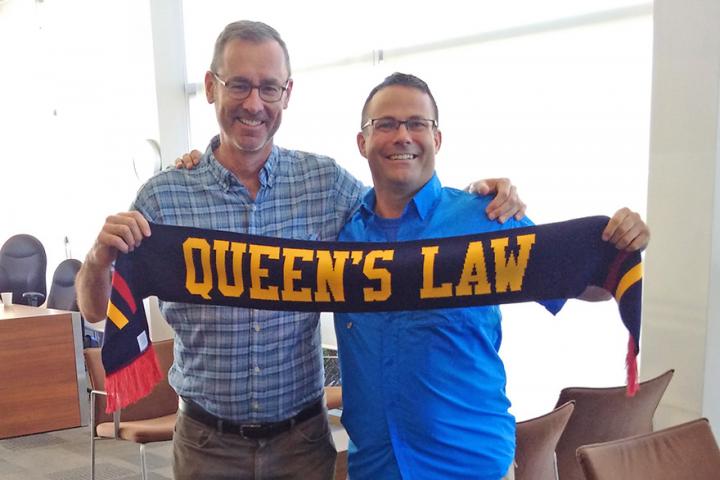Susan Beharriell didn’t intend to become a pioneer for women in the Canadian Forces when she joined in 1973. But determination in the face of adversity allowed her to break down barriers to become Canada’s first post-war female intelligence officer.
In 1972, the Canadian Forces opened up its Regular Officers’ Training Programme to women. Today, as then, in return for four years’ service, cadets are paid a small salary to attend university, their tuition and books are covered, and they receive military training in the summers. When Beharriell learned about the program, she saw it opening up a world of career opportunities for her.
She completed basic training in the summer of 1974, joining 31 other young women in the first platoon of women to complete the same basic officers’ training as men.
“No one, not even our own staff, felt we could succeed. We were constantly told ‘women can’t do that!’ Then we went ahead and did it anyway,” she says.
Despite completing the first hurdle of basic training, Beharriell still had another challenge: winning the confidence of senior leadership in the military.
She applied to become an intelligence officer, an occupation reserved for men only. She was interviewed by three senior officers who were determined to see if she was a “bra-burning women’s libber” who was just trying to make a political statement, she recalls. “None of our lengthy discussions had anything to do with the business of intelligence -- reading maps, analysing anything, briefing people, or writing reports,” she says.
Eventually accepted for the role, she was warned: “You had better measure up or we’ll never let another woman in.”
Beharriell continued her full-time studies during the school year and completed Security and Intelligence training during the summers. She was the only woman on those Security and Intelligence courses.
When she graduated in 1977, she was commissioned as an officer and was posted to Ottawa as a watch officer in the government’s only 24/7 operations centre, the National Defence Intelligence Centre.
Despite having measured up as an intelligence officer, Beharriell faced constant challenges. In 1980, she began her photo interpretation training, causing the chief instructor to submit his resignation “rather than have any god-damned woman” in his classroom. Following his example, the instructors and students refused to speak to her for months, but she persevered in spite of the harassment. “When I was at my lowest, I recalled the warning about ‘measuring up.‘ I could hardly go and complain,” she says.
The chief instructor eventually withdrew his resignation. But when he discovered Beharriell would place first on the course, he ordered his staff to review all the tests and assignments. She still came first, and at the graduation party she received an apology from the chief instructor. “He looked me straight in the eye and said, ‘I will have a woman in my classroom any day.’ That made all the hassles worthwhile,” she says.
The hassles didn’t end there, however. In 1982, Beharriell was posted to Cold Lake, Alberta as the base intelligence officer. When her new boss learned of her arrival, he explicitly refused to have a woman on his operations staff. National Defence Headquarters had to issue him a direct order to accept her. Beharriell got on with her posting. She was responsible for training the pilots of the new CF-18 fighters about the threat from the Soviet Bear Bombers that were probing Canada’s air space in the Arctic during the height of the Cold War. She also planned the scenario and targeting for Exercise Maple Flag, a large-scale air exercise designed to prepare pilots for high-threat combat operations. “It was challenging, detailed and fast-paced work upon which men’s lives really did depend.” recalls Beharriell.
Susan Beharriell on the job in Cold Lake, Alberta, 1982.
There were no female pilots or navigators in the Canadian Forces at that time, and quite a number of pilots – and their wives -- objected to Beharriell’s presence. So once again, she had to overcome gender biases in order to get her job done. She logged more than 80 hours in the back seat of numerous fighters. She now considers it one of her best postings.
In 1986, Beharriell was posted to Winnipeg as the senior staff officer in charge of intelligence at Air Command Headquarters, and then was one of three women to attend the Canadian Forces Command and Staff Course. Posted to Germany, she became the analyst and briefer at NATO’s Allied Air Force Central Europe Headquarters during the First Gulf War, from 1990-1991. She spent nine intense months providing intelligence support to the senior staff.
In 1992 she was seconded to the Privy Council Office writing intelligence analyses for the prime minister, cabinet ministers, the governor general and international allies. Two years later, she returned to Winnipeg as the command intelligence officer running intelligence for the entire Air Force. Beharriell then served as the deputy commander of the Combined Intelligence Centre for NORAD/US Space Command Headquarters in Colorado Springs, Colorado. She was on duty on September 11, 2001.
Finishing her career at the Canadian Forces College in Toronto, she helped design and deliver a new National Security Studies curriculum. Retiring in 2008, after more than 35 years of service, she was inducted as an Officer of the Order of Military Merit.
LCol Beharriell says that while she was on the job, she never gave much thought to the idea of being a trailblazer. “The novelty wore off at about day three. You just carry on. My attitude was in a new posting you’re there just like anybody else to learn to do the job and to do your very best.”
But, now looking back on her career, she knows what an impact she has made.
“I know that I have saved lives in at least one peacekeeping mission,” she says. ““I know that my assessments have helped officials in key operations, in NATO, NORAD, the Canadian Air Force and federal government, to make important decisions. I know that I have contributed to the understanding of national security and Canada’s place in the world for many of Canada’s senior military leaders. And I know that I have helped to show that women are just as capable of successful military careers as the men.”



